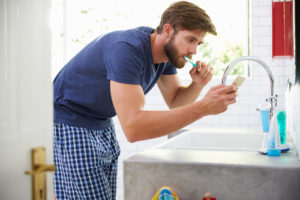 Men have an increased risk of developing sleep apnea. This means it is very important for all you men out there to seek diagnosis and treatment immediately. Speak with Dr. Sunita Merriman about sleep apnea today, even if it is just a precaution. To further emphasize the importance of seeking a diagnosis and treatment of sleep apnea, let’s take a closer look at sleep apnea and how it affects men.
Men have an increased risk of developing sleep apnea. This means it is very important for all you men out there to seek diagnosis and treatment immediately. Speak with Dr. Sunita Merriman about sleep apnea today, even if it is just a precaution. To further emphasize the importance of seeking a diagnosis and treatment of sleep apnea, let’s take a closer look at sleep apnea and how it affects men.
What is obstructive sleep apnea? Obstructive Sleep Apnea (OSA) is caused by obstructed breathing, either due to too much tissue as seen in obesity or decreased muscle tone which may be seen with low testosterone. This inhibits the airflow in the mouth and nose which causes snoring and decreased ability for adequate oxygenation during sleep. As a result, men often wake up numerous times during the night and rarely achieve deep sleep. Most cases of sleep apnea caused by low testosterone is considered to be OSA. While, OSA may primarily be considered a “man’s disease”, but it poses serious and even life-threatening health risks for women who suffer from it, too.
Un-diagnosed sleep apnea is linked to depression. According to research, men with sleep apnea appear to have a higher risk of depression. Men with un-diagnosed sleep apnea had more than double the risk of depression compared to those without sleep apnea, say researchers. And, men who had both un-diagnosed severe sleep apnea and excessive daytime sleepiness, had an even greater risk of depression. It was shown that their risk of depression was up to five times greater than normal. With that being said, it is key that we provide the services necessary for providing men with the diagnosis and treatment they need to overcome sleep apnea.
Seek treatment for sleep apnea now
It is important to gain a better understanding of the resources you need to make educated decisions about your health, which means proper screening for sleep apnea. By catching sleep apnea early, and providing proper treatment options, you can receive the care you need to remain healthy while also getting the rest you need or have been missing out on for so long.
Contact Dr. Sunita Merriman for more information on sleep apnea and how you can take the next steps toward improved health care.


 Untreated sleep apnea is dangerous because it can lead to a variety of comorbidities that include a number of health conditions. From increased risk of cardiovascular disease to diabetes, comorbidities of sleep apnea should not be ignored. Here are a few health conditions that are closely connected to sleep apnea that are nothing to be ignored.
Untreated sleep apnea is dangerous because it can lead to a variety of comorbidities that include a number of health conditions. From increased risk of cardiovascular disease to diabetes, comorbidities of sleep apnea should not be ignored. Here are a few health conditions that are closely connected to sleep apnea that are nothing to be ignored. I’m sure you’re thinking, “wait, what? My neck size? Yes, absolutely. While it may not be known by everyone, neck size plays a pivotal role in the development of sleep apnea. So, why might your neck size increase your risk of having sleep apnea? Let’s find out.
I’m sure you’re thinking, “wait, what? My neck size? Yes, absolutely. While it may not be known by everyone, neck size plays a pivotal role in the development of sleep apnea. So, why might your neck size increase your risk of having sleep apnea? Let’s find out. While symptoms of sleep apnea appear to be different in men than women, it is still a condition that is associated with equally serious health consequences for everyone. In a study conducted by UCLA, women were less likely than men to be diagnosed with
While symptoms of sleep apnea appear to be different in men than women, it is still a condition that is associated with equally serious health consequences for everyone. In a study conducted by UCLA, women were less likely than men to be diagnosed with  Have you ever wondered if you are at risk for sleep apnea? During your search through the internet, you might have read that sleep apnea is a deadly disease, but highly preventable with proper treatment. This is true.
Have you ever wondered if you are at risk for sleep apnea? During your search through the internet, you might have read that sleep apnea is a deadly disease, but highly preventable with proper treatment. This is true.